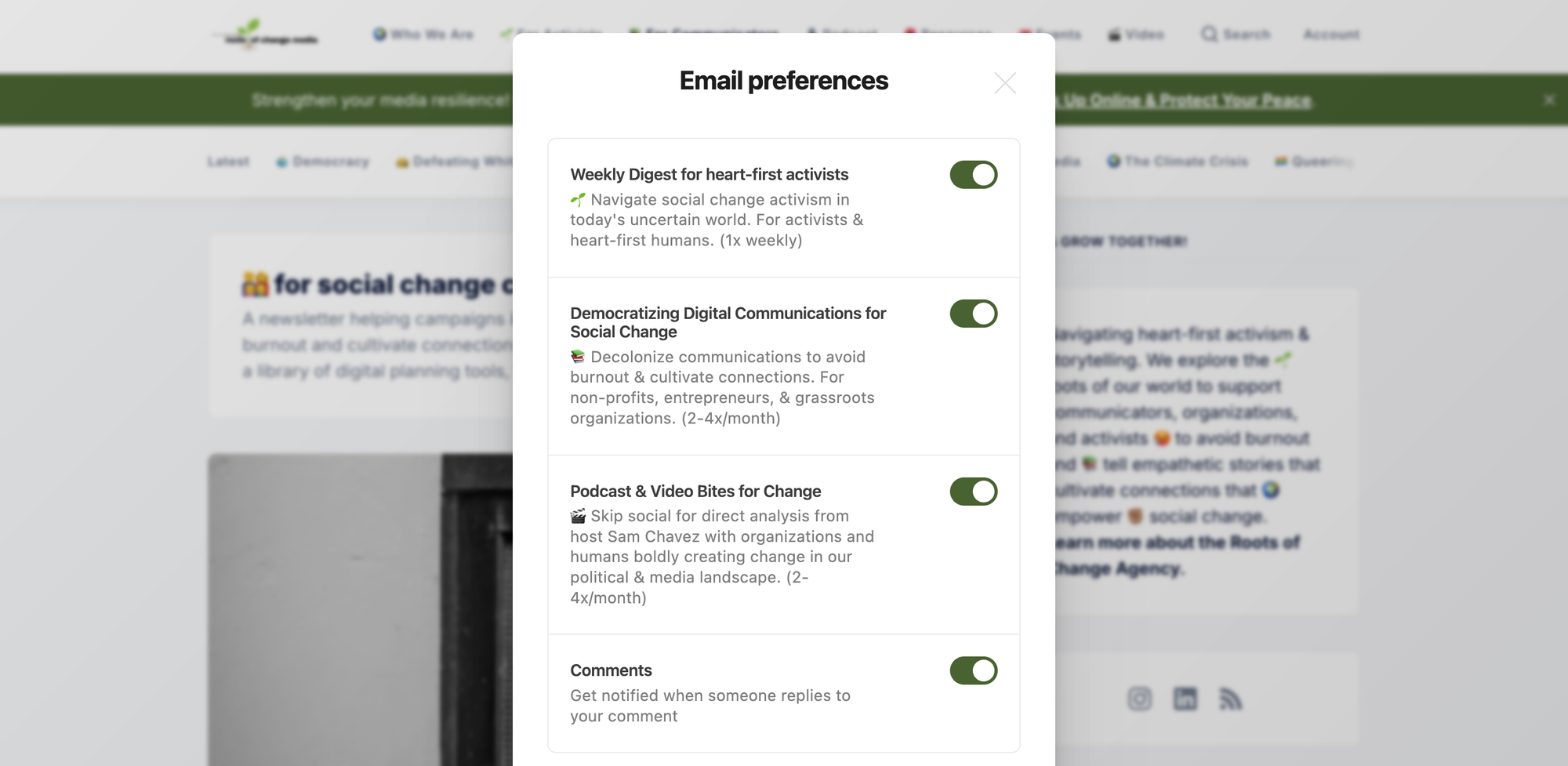🌱 Can We Actually Persuade?| Deep Canvassing for Change
Part II: The Heart & Science of Changing Minds
Welcome Back! 👋🏼
We pause to address the elephant in the room. No, not the GOP, but persuasion. Can we actually change people's minds in time to defeat fascism at the ballot box this November? Plus we re-released my chat with Natalie Burdick to prepare for GOTV season. I promise you'll find some hope to dispel the election anxiety! Read on for more...
In Case You Missed It: 🌱 Building a Big Tent with Motivational Interviewing
📲 Skip the Platforms, Get Direct Updates
My relationship with social media is constantly evolving. Sometimes I enjoy scrolling and sometimes I want to throw my phone across the room. We've covered the harms before. While being on social media is somewhat inevitable, we also encourage engagement outside of the platforms to allow for more authentic engagement and connections.

Update your preferences to get our video roundups, digital communications news, or new podcast and resources alerts. Expand your activism with our library of free and member-only videos for activists and for social change communicators!
💬 Can We Actually Persuade?
Whenever I'm talking to strangers about talking to strangers, I get similar responses. First, there is an awe that I can and choose to talk to strangers. Right after that, I usually get skepticism or questions. Can that really work? We're so divided as a country. Is the solution really to talk it out? I see two extremes of persuasion skeptics:
- They either vehemently believe the status quo will last forever or
- They assume persuasion is about forcing someone to change their mind.
Naturally, the truth lies somewhere in the middle. Despite what social media and the news cycles would have you believe, it is possible to help shift people’s beliefs. And those human-level changes can lead to societal-large cultural shifts.
From Russia with Trolls
Unsurprisingly, the answer is not to scream at the trolls in the comments! Social media has frayed the belief that humanity can stop fighting and come together to solve our global issues. Russia was extremely successful in manipulating Americans emotions during the 2016 election precisely for this reason. As Anand Giridharadas describes in 'The Persuaders: At the Front Lines of the Fight for Hearts, Minds, and Democracy,' the Internet Research Agency in Moscow successfully spread their emotional sabotage across social media using fake accounts from seemingly normal Americans (a rural white man in Ohio, a black woman in Milwaukee). They were able to attach to kernels of truths about the U.S. and leverage the social media algorithm to manipulate people’s emotions. Here are a few samples from their tweets in 2016:
- "Everyone has a beard now and I wonder, is that #beard trend connected with #ISIS or just a coincidence?"
- "Daily reminder that the most educated First Lady in American history is a black women with two Ivy League degrees from Harvard and Princeton."
- "How do you starve Bernie Sanders' supporters? Just put their food stamps under their work boots"
Many of the tweets could seem innocuous, but at the heart was the strategic attempt to divide and destroy. "Their talent was not in inventiveness but rather the faithfulness of their mimicry." In other words, the Russian trolls weren't inventing new ideas, just exacerbating what was already there. "For in America in recent years, this fatalism has been on the rise and the hope of persuasion in free fall." Their campaign was successful precisely because a kernel of these beliefs were already here.
Unfortunately for us, others have learned their tricks. Corporations, billionaires, and right-wing extremists have all learned from Russia’s tactics and are hoping they can flood the zone again in 2024 to swing the election and keep consolidating power. Elon Musk is diligently repeating Russian election disinformation to the tune of 2.1 billion views. We are competing against disinformation from billionaires, foreign countries, and right-wing extremists to counter their message of fatalism for a message for a hopeful vision instead.
My Job Isn’t to Change Your Mind
The first principle to changing minds is admitting that you’re not changing minds. In reality, lasting shifts in a persons belief systems can only happen when they choose. Simply put, you can’t change people’s minds with force.
Instead, the three principles we’re talking about this month take a more heart-first approach to help people change their own minds.
- Motivational Interviewing: an evidence-based method for talking with people about change and growth.
- Deep Canvassing: a method for non-judgemental conversations in which both parties can share their personal experiences, values, and concerns in order to change minds.
- Relational Organizing: Relational organizing is a tool within a broader organizing strategy to build power in which individuals, groups, or organizations harness their personal networks and relationships to effect change. (source: LWV)
While each concept is different, each of them sits on the idea that someone can change their mind through conversation and listening. Listening being the key. In today's hyper connected world, many people are used to not being listened to. When someone is heard on a deeply human level, they are able to feel safe and seen. In this environment, people are more free to express themselves and explore their own reasons for change or identify barriers to overcome.
Cracks in the Foundation
People are emotional creatures. We learn through being with others. We form our opinions and beliefs through our unique experiences with the world and others. In other words, we are shaped by the people around us.
When we practice deep canvassing or other similar methods, we are allowing the person we're talking to to talk through their own thinking about things. In last week's example about deep canvassing for LGBTQ+ rights, the campaign was so successful in reducing transphobia by asking questions and introducing anomalies.
By asking questions and understanding how someone came to their current beliefs, we can help them unpack their experience. Through this work, the person being interviewed will often stumble upon anomalies, or cracks in the foundation of their beliefs. While one or two can be harmless, a cascade of anomalies will shift a person's perceptions and lead to changing their minds. The idea is to open the crack to let a little bit of light in. We're helping to expose something so that the person can think differently about it.
Next week, we will get into the principles of deep canvassing and how we can each use these techniques to talk with people in our lives to create change. We'll learn about the 34% of eligible voters that didn't vote in the 2020 U.S. election and how we can help them turnout to defeat fascism this November.
Enjoying our newsletter? Subscribe for the full monthly series, learn how to navigate 🧭 social change activism in our digital world, and support our 100% reader-supported work.

LinkedIn Is Trying to Find It's Rizz
Like most major social platforms who are reliant on selling advertising for its business model, LinkedIn is trying to court a Gen Z audience. While the media still think Millennials are selfish children, Gen Z has already reached adulthood. The eldest Gen Z are 27 years old now. LinkedIn is launching its first podcast called "Let's Talk Offline" in partnership with iHeart Radio.
- The goal with the weekly chat show is to reach a younger audience interested in navigating the early years of work
- My take? Gen Z is very skeptical of institutions. LinkedIn is tied into the white collar work culture that this generation has been rejecting since before the pandemic.
- Companies are always trying to tap that cool factor for younger audiences. Gen Z is just the latest generation to be misunderstood by corporate marketing teams.
- Consider how you or your organization can dig more deeply into understanding unique characteristics about your own audience. Each generation is not a monolith, how are you engaging more authentically with your audiences?
*note: rizz is what the kids call charisma


- 📸 How Universities Plan to Suppress Student Activists - The United States' elite universities are throwing out free speech and adding new rules to stamp out any pro-Palestinian voices on campus this fall. The new rules and policies, which were crafted by rich donors and Zionist organizations, will lead to more police and militarization on campus, surveillance of activists, and harassment towards students of color.
- 🤓 The Root 🌱 - This is just one part of a larger repression campaign that is being used across all aspects of society including education, politics, entertainment, and more. I continue to reflect on the long history of student protests and how our youth have been instrumental in creating positive change. When we look back at this moment in history, the universities will not be the heroes. The young people standing up for humanity and empathy will.
- 📚 On Time In These Trying Times - Willow Defenaugh insightfully speaks to deep time’s ability for us to tap into the ephemeral and envision our movements across a wider stretch of time.
- 🤓 The Root 🌱 - While we watch the clock, counting down the days until November 5, we can also recognize the broader arc of a movement towards a society rooted in liberation. We are a part of a long line of history who are carrying us forward and giving us strength now.
- 🎬 The Hostile Takeover of Solano County - In 2018, a farmer started to notice that someone was buying a lot of land just north of San Francisco. A shadowy LLC was attempting to quietly buy up farmland. When that failed, they sued the farmers who didn't sell. California Forever is a dream cooked up by the wealthiest Techies to create a private city that is built and run for themselves. They're ultimate goal is to create an autonomous zone outside of government control free from pesky regulation.
- 🤓 The Root 🌱 - I've been following this story closely and will continue to elevate the way billionaires are trying to build their own private resorts and locking the rest of us out as the climate crisis will make our modern cities uninhabitable. Paging Octavia Butler!
And that's a wrap on this week’s newsletter! Don't forget to update your email preferences to customize your resources. We hope you found this helpful in your work to cultivate lasting social change. Forward this to a friend and help democratize communications!
If you have any topics you want covered or have any questions, please reach out and let me know.
In Solidarity,
Sam Chavez
Roots of Change Founder
🌱 Seedling Member Zone
San Francisco houses the biggest tech companies and a writing organization that thinks it's ableist to just criticize artificial intelligence. This week, I debunk NaNoWriMo's lies and how it's actually the other way around. Find our latest videos on our 🎬 Quick Bites page.

This post is for paying subscribers only
SubscribeAlready have an account? Log in



